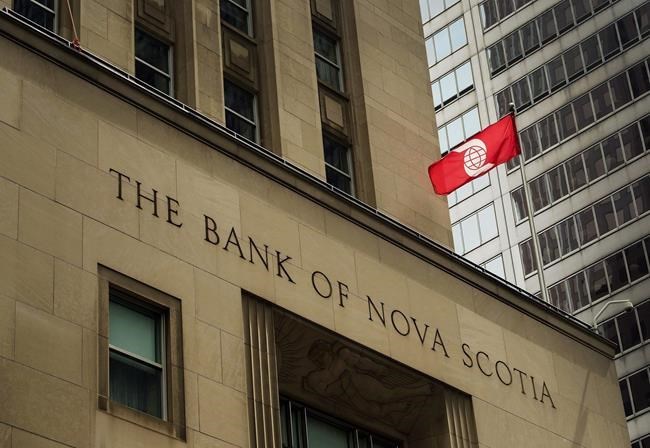TORONTO — Scotiabank's new chief executive says the bank is rethinking its strategy as it reported a drop in profits last quarter because of high funding costs and expense growth.
Scott Thomson, who took on the top job Feb. 1, told a conference call with investors and financial analysts Tuesday that the bank would be examining the loans it makes, as well as ways to boost deposits, as the bank gets squeezed by the same high borrowing costs that face Canadian consumers.
"We have not delivered the level of total shareholder return that our shareholders should expect of us," Thomson said during the conference call.
He said the bank aims to have a formal strategy update out by the end of the calendar year, but that key areas of focus ahead are boosting its capital ratio to 12 per cent and better matching loans with growth in deposits.
As part of boosting its capital ratio the bank has introduced a two per cent discount for its shareholders adding to their holdings through its dividend reinvestment program, as most other banks already have.
To help boost deposits Thomson said the bank would be looking at how it rewards and incentives employees and how it engages with customers.
"This journey will take time and will require a shift in orientation from the way we reward our people to how we collaborate among our business lines, to how we allocate our capital to customers and segments."
Banks get funding through the money consumers and companies entrust to banks, as well as wholesale funding from institutional investors. Scotiabank is one of the more reliant of Canadian banks on the wholesale side, and the funding costs there have grown as central bank interest rates have risen.
Thomson said the bank will be looking to add customers and boost deposits through programs like their Scene Plus loyalty program, along with more attention to small business and the commercial side.
"There's an opportunity for us to be more focused, more deliberate, more consistent on how we go to the deposits," said Thomson.
"We can't be wholesale funding on one hand at really high costs, and then growing the loan book at a rapid rate with profit margins in segments that aren't appropriate. So there will be an adjustment on both sides, both on the deposit side and the loan growth side."
The signal of change ahead came as the bank reported a first quarter profit of $1.77 billion, down from a profit of $2.74 billion in the same period last year, while revenue slipped slightly to $7.98 billion in the quarter from $8.05 billion last year.
Funding costs were part of the squeeze, while expenses grew six per cent from last year as salary costs rose. The bank also had a $579 million income tax expense from the sector-specific Canada recovery dividend tax the federal government brought in with the last budget. Provisions for credit losses amounted to $638 million, up from a provision of $222 million in the same quarter last year.
On an adjusted basis, Scotiabank says it earned $1.85 per diluted share compared with an adjusted profit of $2.15 per diluted share a year earlier. Analysts on average had expected a profit of $2.03 per share, according to estimates compiled by financial markets data firm Refinitiv.
Expectations for the quarter weren't high, but the results still looked disappointing, said Barclays analyst John Aiken, as the net interest margin declined 0.07 of a percentage point.
"Much of the pressure on Scotia’s earnings came from losses in its corporate segment, which was blamed on funding costs (which remains a relative disadvantage for Scotia) and lower gains," he said in a note.
The bank said it expects continued pressure in the short-term as rates, especially in the U.S., could rise further still, but that it is working to refresh its approach for the long term.
"Our results this quarter are a reminder that while we have a powerful banking franchise, we also have opportunities for improvement, which are highlighted in this current rate environment," Thomson said.
"Although I remain cautious on our near-term earnings outlook, I'm confident we'll come out of this year with a strong balance sheet and refresh priorities," he said.
This report by The Canadian Press was first published Feb. 28, 2023.
Companies in this story: (TSX:BNS)
Ian Bickis, The Canadian Press



